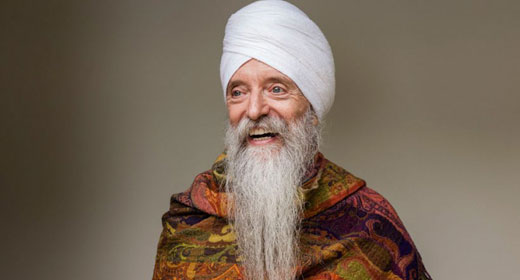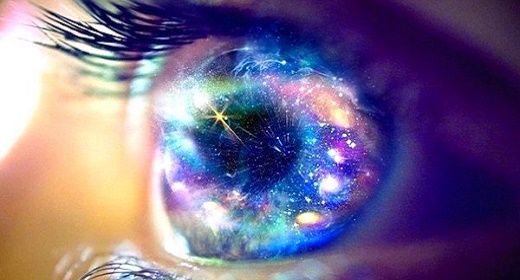Donna Quesada: So there’s this interplay between doing and letting. Doing and letting go.

And it seems like that quality of surrender and letting the grace happen is part of all the traditions…and how do you know when to pull back and allow and let? I guess that’s the…
Guru Singh: Practice, Practice, Practice. It’s the same way with intuition. How do you know it’s your intuition and not just your emotions and your desires and your thoughts?…and it’s practice and it’s failure and it’s trial and error. It’s innovation, it’s giving yourself the authority to innovate. Giving yourself the authority to imagine moving outside of the logical process and incorporating within the logical process a magical process…a miraculous process. Surrendering the fixation on what is called “the hard science” of something and allowing the innovation and the imagination of the meta-science, the meta-physics, the meta chemistry, the meta biology. You think about whenever somebody says to me, “That’s not science; that’s just speculation.” I think, “Holy smokes!…There was a time when gravity wasn’t science because you know, Sir Issac Newton had yet to find it…There were times when the atom wasn’t science because those who discovered the atom hadn’t yet proven its existence. There were times when the molecule wasn’t science…
You know, what Einstein said was really profound in this regard. He said that tomorrow’s reality is the imagination of today. And so, those who are fixated on that hard and fast logical proof really need to surrender because in order to grow into the future which we have never known, we have to surrender that which we have now come to know. Imagine my mother, my father; my father was born in 1901, my mother was born in 1904. And when they were alive they would tell me what it was like before the telephone…what it was like before the automobile…what it was like before the radio…what it was like before the television. Of course, the television took place within my own lifetime. Now you imagine what was it like before the internet…what was it like before the I Phone…what was it like before all these things which are now taken for granted. There are scientific facts, but there was a time when they weren’t even the imagination.
DONNA: Yeah, we have expressions like, “I’ll believe it when I see it” because we’re so attached to our senses and what the senses can reveal to us. But it creates a block to the magic or “maugic” you mentioned. It’s the base of ignorance, isn’t it?
GURU SINGH: Yes, the base of ignorance is the sensory system.
DONNA: I’ve heard it said that we can never really persuade anyone of anything because if the worldview or idea clashes with our own, our left brain will actually shut down. It will go to work to prevent the information from entering. So, it has to be experiential…so, we almost have to put the “I’ll believe it when I see it’ aside. Because we can’t see it and we can’t come to the belief of that experience.
GURU SINGH: Yeah, and we can’t come to the experience without opening to the unknown of the experience, which has never happened before. Any new experience is going to be just that—that unknown quality that we’re going to have to open up to, which is where faith and trust come in.
DONNA: You know, this brings me to another question I would like to ask you about. I want to get into the heavyweight questions, if you don’t mind. I’ve had students come to me who are skeptical of ideas like faith or God because of the scientific world we live in. How do you reconcile that kind of skepticism with someone who’s absolutely blocked? Or, how do you bring someone to even the brink of possibility to ideas like faith and god and magic?…When there’s such a block, a deeply entrenched block there?
GURU SINGH: Like the waves of the ocean when they’re crashing against the stones of the beach—eventually those stones won’t exist. They will have been dissolved into sand granules. But every time the wave hits them it appears that the stones have stood fast and the wave has lost the battle…but in fact, I never tried to accelerate someone’s growth faster than their doubt, and so, I will look at, I will listen to the tones of a person’s voice in the conversation that they’re having and I will be able to…I can determine whether or not I will want to invest the time in shifting their awareness or if I should just let the waves of time crash against their shores.
There’s a saying in spirit based metaphysics and that is, you will either learn from a teacher, or, if you’re too stubborn you will learn from time. And time is a much more arduous teacher than a teacher, normally Generally, a teacher will show you some version of compassion in the process of guiding your learning and that is necessary when you come upon someone. Now, if that person I’m communicating with is showing any sign of willingness to release their fixation…if I can see it, I will believe it. Then I will begin to discuss things like faith and trust and God. You know, when Yogi Bhajan would be asked, “where do you find God?” He would always say, “in the dictionary.” And then he made up an acronym. GOD. Generate. Organize and Destroy…or Deliver.
Because you know, God is one of those words…there’s been many words that have been really put into a fixation point…I deeply respect your values that you have achieved. You being you. In your Zen Buddhist studies and journeys of all those years. Because that which can be defined is not God. Well, it’s a part of God, but it’s not the total God. And so, one time Yogi Bhajan was giving a lecture and after the lecture a student walks up to him and the student said “Wow, that was really an impressive lecture.” Yogi Bhajan nodded and bowed. And the student said, “I just want you to know that I’m an atheist.” And I’ve never seen this happen at any other time, but Yogi Bhajan’s hand shot out and he shook this gentleman’s hand and he said “me too.” And the man said, “what do you mean you’re an atheist, you used the word Godso many times in your lecture.” And Yogi Bhajan said, “I’m not talking about that God. I’m talking about the God…I’m talking about the God that can’t be defined…I’m talking about the experience that can’t be explained…I’m talking about all of those things…I’m not talking about that limited version of god that neither you nor I believe in.”
DONNA: And I think that limited version is what has given rise to so much difficulty. Like the “problem of evil” I discussed, even with my own son. How do you reconcile the good God with all the horrendous stuff that goes on in our world? But I think that’s the limited image of God we’ve created.
GURU SINGH: Well, yeah, the idea that God is good, good, good, good, good…just light light light is ridiculous.
If God is really an infinity than an infinity is everything and more. You know, it’s not just that which we know. but it’s that which we don’t know. And it’s not just the idea of God of as a father. Have you ever seen a pregnant man? What gives birth to the universe? You know, It can’t be a man, it can’t be a father. There’s got to be a woman, there’s got to be a mother there someplace. So, all of this God is the father and gave his only son…where is the woman in this picture, right? And so, the idea that you awaken to the possibilities that have been defined and explained previously to this moment is not telling the whole picture…that there’s a lot more to the picture you can find, if you open up to the possibilities…and that’s where the atheist and the spiritualist walk hand in hand. That’s where the atheist and the Zen Buddhist and the Taoist walk hand in hand. And that is that if you can define it. It isn’t the total. It isn’t the total of God and therefore the same thing to do with the words faith and trust.
Faith and trust are devotions and devotions have no object. And so, it’s not that you have faith in something. That’s called accountability. That’s called a reliability. But that’s not faith. Faith is just a sensation of, it is working out. Trust is a sensation of, it is going to be ok.
DONNA: And hope?
GURU SINGH: Hope is just an opening to that which can be. Hope is also a very powerful devotion and all devotions have been completely misconstrued, completely mystified and misunderstood over the centuries because except for those original characters involved in most religions, everyone that came later on is a terrible statement. Many of the people who came later on, did not have the quality of consciousness. So they had to create definitions and explanations. And as the definitions and explanations pass through generations, they become like a photo copy of a copy of copy of copy. They become less accurate and less able to define…to describe that…attempted to be explained.
DONNA: This is interesting. Would it also be because the subsequent pastors and representatives lack the experience that the originals had?
GURU SINGH: Absolutely. So, for example, Buddha and Jesus had direct experience of the divine but all of the future speakers maybe lacked the experience, so it gets diluted and misrepresented, but in fact, they all can walk together. As we said, the Zen Buddhists and the Taoists. It’s all is the same, isn’t it?
Yeah, I always loved the comedy, Life of Brian. Remember Life of Brian?
DONNA: I don’t.
GURU SINGH: Well, it was…what is that group, Monty Python? Monty Python, life of Brian and there was this fellow in the very back and he couldn’t see…and he was taking prolific notes..and he kept asking, “What did he say?… “What did he say?”… “What did he say?” And finally, one of these people that was being completely bothered by his incessant questioning turns around and he said, “What are all these questions? What are you doing?” And he said, “I’m writing the book: The book” “What book?” “You know…The Book.” And obviously, it was an indication that he was writing Biblio,which is Bible,which is just the word for book,and like, bibliography…and he was writing the bible and that’s what it is.
It is just a story of story of a story of a story. The idea that these scriptures were somehow exact representations of an experience is stretching the reality of experience beyond its ability to explain. And that doesn’t mean that these scriptures are bad or wrong, it just means that they’re incomplete and should be accepted as meaningful…and yet, they use metaphors and they use allegories and they use stories as ways of explaining things, just like I do…just like you do when we’re teaching in a class. And those stories and those explanations and those examples are not necessarily the factof the experience, but they’re being used to help people to understand what the experience might be. And that’s very important…that kind of a fluid, liquid relationship because people will look at you, “You must a be a Sikh”… and I say, “yes…and I’m a Jew and I’m a Christian, and a Zen Buddhist and I’m a Jain and I’m a Muslim and I’m all of these things because I incorporate every bit of everything in me in order to have a full picture because no oneview is going to give me the full picture.
DONNA: And yet, there are certain differences which do seem to be meaningful in some way, for example, we were talking about Buddhism earlier in our conversation and this idea that life is fraught with suffering and angst…but his idea was to not attach, to not have desires. And this has been something I’ve given a lot of thought to because desires give us…
GURU SINGH: I don’t know if that was his idea but I understand that we’re told that that was his idea. Go ahead.
DONNA: Well, I…it’s funny because when you think about having desires, you think, well, that’s what makes me want to get out of bed in the morning…that’s what makes me want to get up and get to it. So, maybe he either meant something else, or that, too has been distorted.
GURU SINGH: Or, he didn’t say that (Laughing)! Or, it was a story of a story of a story that got translated into have no desires. You know, I remember one time when Yogi Bhajan was teaching a class…he said, “I’ll teach you what desirelessness is about”… “Now, everybody inhale…okay now everybody exhale”… And he didn’t say anything. And then all of a sudden, he said, “Oh I’m feeling some desire in the room.” Inhale,right? Living in the physical you cannot be without desire. That is an impossibility and so I question a couple of those phrases. Be without ego…ego is what ego does. You cannot be without ego. Ego is the glue that holds soul and body…it’s what gives you the direction and the ignition in your life. You choose to do something because you have a desire to do it, like you said…gets you out of bed in the morning. If you’ve got no ego…if you’ve got no desire, you’re just going to lay around in a blob until you suffocate, or you know, figure it out and start to engage. Ego is a good thing.
DONNA: In that sense, it’s a bit like money—it depends on what you do with it.
Read Part III Here: Now Is The Time We Need Millions of Masters
Read Part I Here – Awakening Is a Spectral Process








































